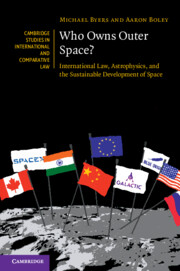Crossref Citations
This Book has been
cited by the following publications. This list is generated based on data provided by Crossref.
Boley, Aaron
and
Byers, Michael
2023.
Anti-satellite weapon tests to disrupt large satellite constellations.
Nature Astronomy,
Vol. 8,
Issue. 1,
p.
10.
Vieira Neto, Ernesto
Pires, Pryscilla
and
Giuliatti Winter, Silvia
2023.
Trajectories for mining space mission on asteroids in near-Earth orbit.
The European Physical Journal Special Topics,
Vol. 232,
Issue. 18-19,
p.
2967.
Johnson, Christopher
2023.
Security, Policy and Legal Challenges of Planetary Defense.
SSRN Electronic Journal,
Morin, Jean-Frédéric
and
Tepper, Eytan
2023.
The Empire Strikes Back: Comparing US and China’s Structural Power in Outer Space.
Global Studies Quarterly,
Vol. 3,
Issue. 4,
Wu, Di
and
Rosengren, Aaron J.
2023.
An investigation on space debris of unknown origin using proper elements and neural networks.
Celestial Mechanics and Dynamical Astronomy,
Vol. 135,
Issue. 4,
Ganz, Abra
Camellini, Martina
Hine, Emmie
Novelli, Claudio
Roberts, Huw
and
Floridi, Luciano
2024.
Submarine Cables and the Risks to Digital Sovereignty.
Minds and Machines,
Vol. 34,
Issue. 3,
Graefrath, Moritz S
and
Jahn, Marcel
2024.
Political Spaces Beyond the Nation State: The Global Commons in International Security Studies.
Global Studies Quarterly,
Vol. 4,
Issue. 4,
Carvalho, Christian Danner Ramos de
Chai, Cássius Guimarães
Serra, Mayanne Camara
and
Fonseca Neto, João Viana da
2024.
Desafios ambientais e sustentabilidade no contexto geopolítico aeroespacial .
Revista de Gestão e Secretariado,
Vol. 15,
Issue. 9,
p.
e4174.
Peng, Kang-Lin
Kou, IokTeng Esther
and
Chen, Hong
2024.
Space Tourism Value Chain.
p.
75.
Tapan, İrfan
2024.
Dünya Dışı Seyahatler Çağı: Uzay Turizminin İlk Yolcuları.
Fikriyat,
Vol. 4,
Issue. 1,
p.
276.
Yazıcı, Ayşe Meriç
and
Persson, Erik
2024.
Engineering and Technology Management in Challenging Times.
Vol. 1137,
Issue. ,
p.
145.
Ganz, Abra
Camellini, Martina
Hine, Emmie
Novelli, Claudio
Roberts, Huw
and
Floridi, Luciano
2024.
Submarine Cables and the Risks to Digital Sovereignty.
SSRN Electronic Journal,
Mührel, Jasper
2024.
Rights of Nature in Liberal Legal Systems and International Law.
p.
75.
Alsuwaidan, Mohammad
Atallah, Ahmed
and
Rosengren, Aaron J.
2025.
A Game Theory Framework for Space Debris Management.
Abbas, Sheer
2025.
Challenges to Space Activities in the Context of Mega Satellite Constellations: A Focus on Environmental Impacts.
Journal of Astronomy and Space Sciences,
Vol. 42,
Issue. 1,
p.
1.



